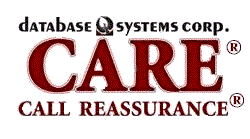|
|



Home Alone Children Guidelines
 Database Systems Corp. (DSC) provides automatic call processing systems and technology including phone systems that broadcast voice messages to community members. This technology is ideally suited for community service applications.
Database Systems Corp. (DSC) provides automatic call processing systems and technology including phone systems that broadcast voice messages to community members. This technology is ideally suited for community service applications.
DSC provides a complete phone system and software solution called CARE (Call Reassurance) that calls seniors or children left alone at home.
Contact DSC to learn more about our CARE latchkey children services and phone systems.
Home Alone Children - Safety Tips For Working Parents
The following is an article describing safety tips for parents who have child to stay at home alone for any period of time. Home alone children (children being on their own at home) is not a new concept.
The Phrase Latchkey Kid
The phrase latchkey kid actually originated in the early 1800’s, when youngsters who were responsible for their own care wore the key to their home tied on a string around their necks. Today, however, with an increasing number of parents who work, there are more home alone children after school, and many who care for younger siblings, too.
Is The Child Ready?
There is no magic formula to measure a child’s readiness to assume self care at home. Very often, circumstances drive the issue; daycare might become unavailable, cost-prohibitive, or unsatisfactory, or there is no neighbor nearby to provide supervision along with their own children.
A latchkey child should want to stay alone, and be comfortable assuming the additional responsibility. Some experts suggest that an excellent way to find out is to ask your child -- most children will tell the truth. If your youngster is prone to be a worrier, has nightmares, or is nervous or anxious when he or she is alone, they may not be ready to stay by themselves. There are children, on the other hand, who will welcome the opportunity to demonstrate their maturity and will take pride in being allowed to take charge. In most cases, however, it will probably take a considerable amount of family discussion before a decision is reached.
eCARE Provider - eCOPP

"e-copp is an elementary or home school based children's educational program dedicated to protecting children through awareness of Internet dangers and instruction on dealing with them. Our goal is to prevent the victimization of children from predatory internet activity. It is an empowering program that provides adults and teachers the tools needed in taking an active role with children's internet experiences." - www.e-copp.com
eCOPP has selected Database Systems Corp. to provide the technology necessary to check-in on home alone children when parents are still at work. eCOPP allows parents to subscribe their children into this service from their website.
|
|
Are The Parents Ready?
The other issue intertwined in whether or not children are allowed home alone, is are the parents ready to leave their youngsters unsupervised at home. The first question to ask yourself is, “What is going to give me an acceptable level of confidence about this?” In other words, what do you need to know about the safety of your child being at home that will allow you to do whatever it is that keeps you away from home in the first place?
Consider your children’s maturity level. Do they understand -- and follow -- safety instructions? How do they do when it comes to making decisions under pressure? Do they think clearly and make the choice you would want them to? Do you have any first-hand information about how they would react in an emergency? How safe is your neighborhood? Do you -- and your child -- know your neighbors, and trust any (or some) of them to come to your child’s aid if necessary? Do they know about calling 9-1-1?
If you can’t answer these questions with confidence, perhaps more time is needed to reach a decision.
Latchkey Kids and The Law
Another important thing for parents to consider is the law. In Texas, for example, under the section covering “abandoning or endangering a child,” a person commits an offense if, having custody, care or control of a child younger than 15 years, he intentionally leaves the child in any place under circumstances that expose the child to an unreasonable risk. It is the position of Child Protective Services that a school age child may be left in the home alone if he or she has the mental and physical ability to react in an emergency situation.
According to Harris County Pct. 4 Constable’s Chief Deputy, Karen Moore, “Parents want to do what’s best for their child but, when both parents have to work, sometimes there are not a lot of options. Obviously, the best scenario is for an adult to provide care and supervision for children while mom and dad are at work -- at home or in some kind of day care of after school program. When that’s not possible, one solution is to prepare youngsters who will be staying home alone for part of the day by setting down firm rules, insisting that they be followed, and telling youngsters exactly what is expected of them, so there is absolutely no doubt they understand.”
“After a specific period of time,” the law enforcement expert continued, “its a good idea to sit down with your child or children, ask them how the time alone is going, invite them to express their concerns, and carefully go over the areas where additional attention is needed. Very often, when youngsters understand how critical their support and cooperation are to their parents and to the family as a whole -- and that there are reasonable rewards for success -- they are eager to demonstrate their ability to accept responsibility. To make it work, however, there has to be a basic agreement -- almost a contract -- between the kids and the parents about specific conduct and safety issues. The parents have to have confidence that their kids will be safe...and the children have to believe it, too.”
Where To Start
There are some rather obvious things a family should do when preparing for youngsters to stay at home alone after school, beginning with a thorough check for safety risks in the house or apartment. This includes obvious dangers like access to firearms, adult beverages, and kitchen appliances -- especially those that use natural gas. (If cooking is to be “off limits,” plan to have snacks on hand that do not require heating up.)
This is a good time to put together a First Aid kit with your child, and discuss appropriate measures in the event of an injury. Post emergency phone numbers near all the telephones in the house, and be sure to include contact information for neighbors and other relatives who live nearby. Take this opportunity to review emergency evacuation drills to refresh their memory about how to get out of the house in case of fire.
Dialing 911
“Most youngsters today know about calling 9-1-1 in an emergency,” said Brad England, executive director of Cypress Creek EMS. “We spend a lot of time at local schools and at day care facilities teaching youngsters to ‘Make the Call.’ Parents can help by discussing what to do in different kinds of emergencies, and to tell your child -- if they have any doubt at all about how to respond in an emergency -- to call 9-1-1. It is important for any youngster who is trusted to be home alone to know key identification information -- the home address, parents’ work numbers, and the name and phone number of a neighbor or responsible adult nearby. If your child ever does have to call 9-1-1, our dispatchers are especially trained to calm the caller, to provide understandable instructions, and to keep the child on the line until the emergency is resolved or our team arrives on the scene, if that is appropriate.”
“Along with other back-to-school instructions,” England continued, “be sure to require your child to take the same route to and from school each day, and to come straight home from school. Set up a check-in message routine so you’ll know they made it safely home even if you can’t come to the phone when they call. Another important safety rule is to caution your child NEVER to enter the house if the door is open, or if it appears it may have been broken into. Tell them to go to a neighbor’s home for help and, if a break-in is also suspected by the adult, to call 9-1-1 for emergency assistance.”
Keep The Doors Locked
“We recommend that, once they are home, that children keep the doors locked at all times,” urged chief Deputy Moore. “The best rule is no company, no exceptions. That means when mom and dad are away, not even friends may enter the house. If someone calls and asks for a parent, the child should say they can’t come to the phone without letting the caller know they are home alone. It is also not advisable for kids to talk about being home alone and to keep their house key safely out of sight. Not only is it a temptation for friends to visit, but a careless word could alert others who might be unwelcome visitors.”
“Parents certainly don’t want to make their children paranoid about staying alone in the house,” Moore acknowledged. “But it is entirely appropriate to go over safety instructions and to discuss potential dangers. Things have, unfortunately, changed in our society, and each of us has the responsibility for our own security and protection. This is a case where it is truly better to be safe than sorry.”
Safety Tips For Home Alone Children
Here are some other basic safety tips for being home alone:
- Establish “House Rules.” Write them down, post them, and review them periodically. Consider including homework and chores, using the phone, computer or kitchen appliances.
- Stress early on that parents should not be called to settle minor sibling disputes and disagreements. These can be addressed in the evening or at special weekly “meetings” held for just that purpose.
- Practice emergency procedures, including calling 9-1-1. Don’t assume that youngsters will know what to say on the phone in the event of an emergency, so rehearse some possible situations and talk about what you would expect them to do in each one.
- Do some role playing to make children comfortable answering phone calls and taking messages, as well as dealing with things like peer pressure (other kids wanting to come inside) and strangers.
- If you have a change of plans, or if you are not going to return home when you said you would, call and reassure your children. They tend to worry when things don’t go according to plan, and a lack of information can cause them to panic.
- There are many occasions during the school year when youngsters have after school activities. Be sure to discuss each day’s schedule -- including all transportation plans -- so that parent’s won’t worry if the “safe home” message is not received when expected.
- Try to avoid placing too much responsibility on a young child and listen carefully when a “home alone-er” wants to share concerns or problems.
Remember, no matter how mature your child acts, he or she is still a child. Children invariably make mistakes; they don’t always react in a situation as you wish they would. And, even if they start off well without adult supervision, they can get “spooked” and develop real fears about being home by themselves. Give your youngsters lots of encouragement, support and reinforcement, and treat their mistakes as learning experiences instead of failures. Show them how much you appreciate their helpfulness, self-reliance and cooperation while you are away, and be liberal with appropriate rewards
Individual Latchkey Child Signup
DSC provides an easy and secure sign-up procedure (For a quick overview, please visit the registration information web page). Everything can be done using our Latchkey Kids website.
- Online Enrollment - Sign-up online using our secure website.
- Child's Profile - Specify your child's profile (window of time to make calls to your child).
- Name Contacts - Identify who we need to contact if we can't reach your child.
- Secure Payment - Choose one of several enrollment and payment options and pay online using Visa or MasterCard.
DSC provides online and phone management of your account. This lets you view a history of the calls. You can also manage the dates and times for these calls including vacation days.
Plus our service is performed automatically - there are no operators involved so we can ensure your child's privacy.
Create An eCARE™ Community Account
eCARE™ is an online service developed by DSC for community organizations or groups that wish to provide CARE services to their members. By creating an eCARE account, you can add one or more members to this account and manage individual schedules and call information as if you had your own CARE phone system. eCARE accounts are designed for groups who do not wish to purchase and maintain computers or lease phone lines. DSC does all of that for you.
You can create and manage a community organization eCARE account for free using our online registration process.
With this account, you can enroll children and other community members using various different profiles including home alone children calls. Individual members of this community receive special discounts when enrolled through a single eCARE account.
Click on the Create eCARE™ Account link below.
Enter your organization's name, a valid email address along with your own password, and we will establish your eCARE account.
eCARE can now be used as your primary calling program for seniors in your community or can be a backup to any other system that is currently making these calls.
eCARE is a pay-as-you-go service and you only pay for the calls that we make.
Articles About Call Reassurance
CARE Information
Contact DSC to learn more about our CARE latch key child services and phone systems.
|
 CARE Information
Home Alone Kids
CARE Information
Home Alone Kids
I'm OK Today
CARE Volunteers
Telecare Services
 Telecare Information
Telephone Reassurance
Telecare Information
Telephone Reassurance
Senior Services
Elder Care Calling
Latch Key Children
Telecare Phone Systems
Phone Reassurance
Call Verification
Call Elderly
Elderly Home Care
Phone Reassurance
Buddy System
Call Latch Key Child
Senior Care Systems
Reassurance Calling
|




 Database Systems Corp. (DSC) provides automatic call processing systems and technology including phone systems that broadcast voice messages to community members. This technology is ideally suited for community service applications.
Database Systems Corp. (DSC) provides automatic call processing systems and technology including phone systems that broadcast voice messages to community members. This technology is ideally suited for community service applications.


